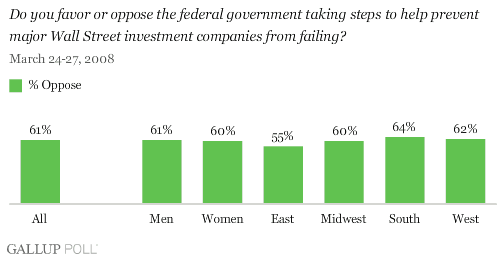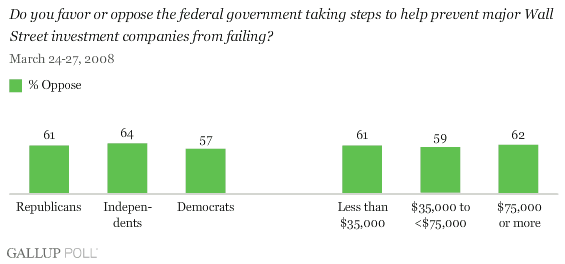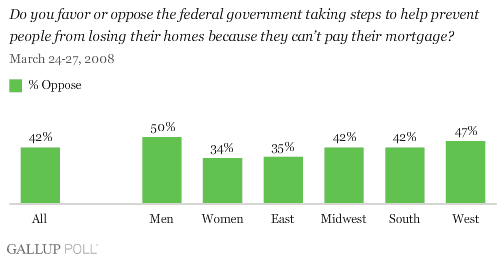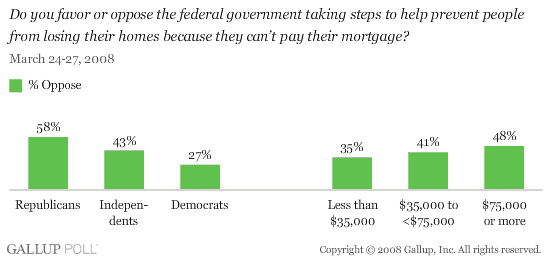PRINCETON, NJ -- A new Gallup Poll, conducted March 24-27, shows that 6 in 10 Americans oppose the federal government taking steps to help prevent major Wall Street investment companies from failing.

Widespread Opposition to Helping Bear Stearns
On March 13, Bear Stearns told the Federal Reserve it would file for bankruptcy the next day and as a result, the Fed voted on March 14 to extend the investment company emergency credit to keep it from failing. On Sunday, March 16, the Fed, with the support of the U.S. Treasury, extended a $29 billion loan against Bear Stearns assets to facilitate its merger with JP Morgan.
On Wednesday, Fed Chairman Ben Bernanke defended this highly unusual emergency action by stating, "Given the current exceptional pressures on the global economy and financial system, the damage caused by a default by Bear Stearns could have been severe and extremely difficult to contain." He went on to explain essentially why the Fed felt Bear Stearns was too big to fail in terms of its role within the global financial system. He continued his explanation Thursday before the Senate Banking Committee.
While the Fed's effort to maintain financial stability is clearly justified when viewed in economic terms, it is opposed by a surprisingly uniform 6 in 10 Americans across a wide variety of demographic groups: men (61%) and women (60%); those in the East (55%), Midwest (60%), South (64%), and West (62%); those with annual incomes of less than $35,000 (61%), of $35,000 to $74,999 (59%), and of $75,000 or more (62%); and even those affiliated with political parties (or with no party): Republicans (61%), independents (64%), and Democrats (57%).

Differing Degrees of Support for Helping Homeowners
In sharp contrast to their opposition to helping Wall Street investment companies, Americans -- by a margin of 56% to 42% -- support having the federal government take steps to help prevent people from losing their homes because they can't pay their mortgages. More importantly, support for such federal efforts varies significantly across demographic groups. While women favor the government helping homeowners by 63% to 34%, men are evenly split, with 50% in opposition compared to 48% in favor.
People in the East favor the government helping homeowners, by a 63% to 35% margin, while those in the West are split (50% in favor, 47% opposed). Those making less than $35,000 a year (63% to 35%) and those making $35,000 to $74,999 (57% to 41%) tend to favor government help, while those making $75,000 or more are divided (51% in favor, 48% opposed).
Democrats overwhelmingly (by a 71% to 27% margin) favor the federal government acting to help homeowners. Independents are also in favor, but by a slimmer margin of 55% to 43%. In contrast, Republicans oppose such efforts, with only 40% in favor compared to 58% opposed.


Are Wall Street Firms "Too Big to Fail"?
For decades, observers of the financial markets have argued about the idea that some financial firms may simply be too big to fail. The nation's largest financial companies do business on a daily basis with other financial firms and individuals (counterparties) around the globe. These transactions are conducted based on a high degree of confidence that no one involved needs to worry that the very large financial companies they are dealing with might default on their obligations. The "too big to fail" concept suggests that the failure of a large financial services company not only might mean widespread losses for the stockholders and others doing business with the company, but would also severely shake the confidence of everyone in the financial system that the nation's largest financial services firms will always meet their financial obligations. Hard as it may be to believe, if confidence in the financial sector is shaken badly enough, the system could actually collapse, re-creating conditions similar to those of the Great Depression.
Most likely, Americans aren't highly cognizant of the actual possibility that there could be a global financial collapse. However, if the keepers of the financial system -- the Fed and the Treasury -- show fear that the system might lose its stability, they could shake the very confidence they are acting to preserve.
On the other hand, it is relatively easy for the average American to identify with a family that buys a house and gets a mortgage loan but finds it cannot make rising mortgage payments. By contrast with the financial services crisis, no one is particularly worried about pointing out the distress such mortgage situations are causing millions of American families.
While federal officials, the president, and the Congress may act against public opinion to preserve global financial stability, it seems hard to believe they will not also respond to help American homeowners. In fact, swooping in to rescue struggling homeowners could be crucial in offsetting consumer resentment toward the Fed over its Wall Street bailout.
Survey Methods
Results for this panel study are based on telephone interviews with 1,005 national adults, aged 18 and older, conducted March 24-27, 2008. Respondents were drawn from Gallup's household panel, which was originally recruited through random selection methods. The final sample is weighted so it is representative of U.S. adults nationwide. For results based on the total sample of national adults, one can say with 95% confidence that the maximum margin of sampling error is ±4 percentage points.
In addition to sampling error, question wording and practical difficulties in conducting surveys can introduce error or bias into the findings of public opinion polls.
